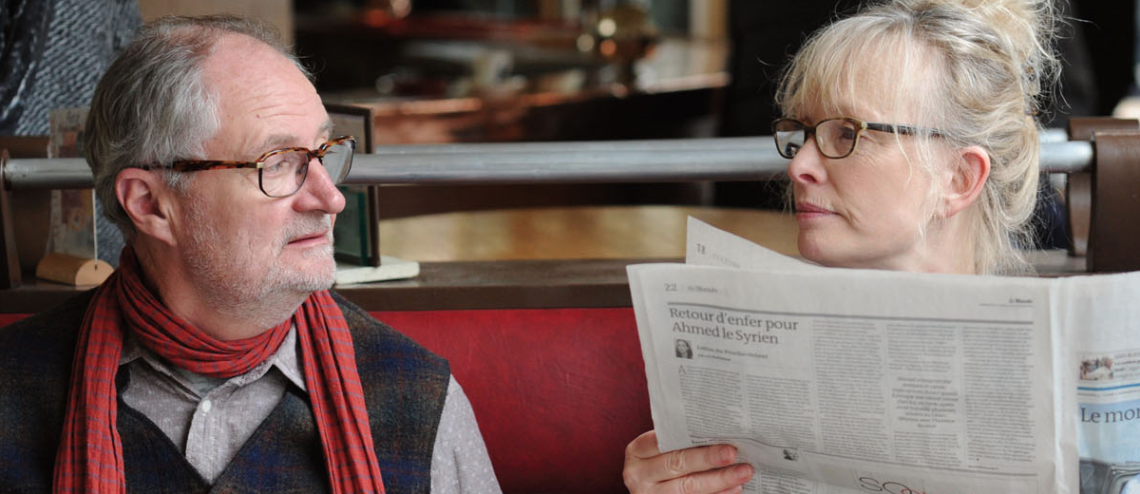The baby boomers were perhaps the first generation in history where being cool was a legitimate cultural goal. Coolness, youth, and counterculture were all the rage when Nick (Jim Broadbent) met and married Meg (Lindsay Duncan). The British couple, now in their sixties and celebrating their 30th wedding anniversary, try to rekindle some of that youthful adventure with a weekend trip to Paris, where they spent their honeymoon so many happy years before.
Le Week-End marks the fourth collaboration between writer Hanif Kureishi and director Roger Michell, and it mines similar territory as their earlier films The Mother (2003) and Venus (2006), which also dealt with the challenges of late-middle/old age. Like these films, Le Week-End is a deceptively provocative and complex portrait of people who vacillate between love and hate, good and bad, weak and strong–sometimes within the same moment.
Nick and Meg bicker like teenagers. Over the weekend, their behavior regresses to youthful, bold expression (Nick begins decorating their very expensive hotel suite with pictures of his heroes a la a Freshman dorm) and flighty, impetuous decisions (Meg’s spontaneous mood swings would give any teenage girl a run for her hormonal money). Perhaps the biggest indicator of their late-midlife crisis (AARP arrested development?) is the film’s soundtrack cues and frequent reference to French New Wave movies.
The movie features two Nick Drake tracks, which calls to mind the tragic-romantic folk singer’s music in The Royal Tenenbaums and Garden State, two films very much about families in crisis and their failure to adapt to change. References to the work of Jean-Luc Godard permeate the film, from the title (although Michell is nowhere as self-destructive as Godard’s 1967 film), to the multiple allusions to 1964’s Bande à part (watching the movie on TV, Nick and Meg dance along to the famous scene of the main characters dancing in a cafe).
That these references themselves are 40-50 years old, and yet still serve as reference points to a kind of permanent youthful attitude, speaks to one of the central themes of the film: that while a person’s state of mind may remain young, their body, their physical desires and capabilities, their relationships with other people—these all inevitably decay. While Nick may want to listen to Bob Dylan, smoke pot and make love with his wife, the reality of the situation doesn’t necessarily allow such freedom. And while Meg may want nothing more than to tour Paris on foot and soak up the beauty of centuries of Parisian architecture, their grown-up son keeps calling them, asking for money and begging to move back in with his parents.
Nick and Meg’s domestic troubles, heretofore only hinted at, are brought to the forefront when they run into one of Nick’s old Cambridge colleagues by chance. Morgan (Jeff Goldblum) used to be an acolyte of Nick’s at school but has now way outstripped him in terms of success and popularity. Morgan lives in a very chic Parisian apartment, has just written a best-selling book and married a young French wife. He seems to have everything Nick doesn’t, but one day, might have had. It’s worth noting that the casting of Goldbum in the role lends the film a bizarre, otherworldly quality, as Goldblum delivers his lines as only Goldblum could, with a unique blend of aloof sincerity and wry arrogance. When the couple is invited to Morgan’s dinner party, Meg is utterly bored and Nick is humiliated by the other party guests, all of whom seem to have succeeded in ways unimaginable to him.
While neither Nick nor Meg seems particularly enamored of Morgan, his lifestyle represents an aspirational saving grace for their lost weekend in Paris (one which they can hardly afford). For his part, Morgan seems delighted to help his old friends out of a jam. The film ends with another delightful Godardian moment, an uptick of joy and optimism that seems fleeting and momentary. Le Week-End is not a bleak film, but it delves so frequently into uncomfortable truths and very personal injuries, one might begin to wonder why Nick and Meg even bother staying together. There are moments of sweetness between them, just as there are moments of intensity, sexuality, flirtatiousness, intimacy and deeply-felt humor. Broadbent and Duncan bring a terrific lived-in quality to their characters. At times, Le Week-End plays like the next entry in Richard Linklater’s Before trilogy, but it’s a tribute to the actors, Kureishi and Michell that we don’t need three films to establish such an intimate familiarity.
Le Week-End opens in New York and Los Angeles 3/14, and expands to more theaters 3/21.




















